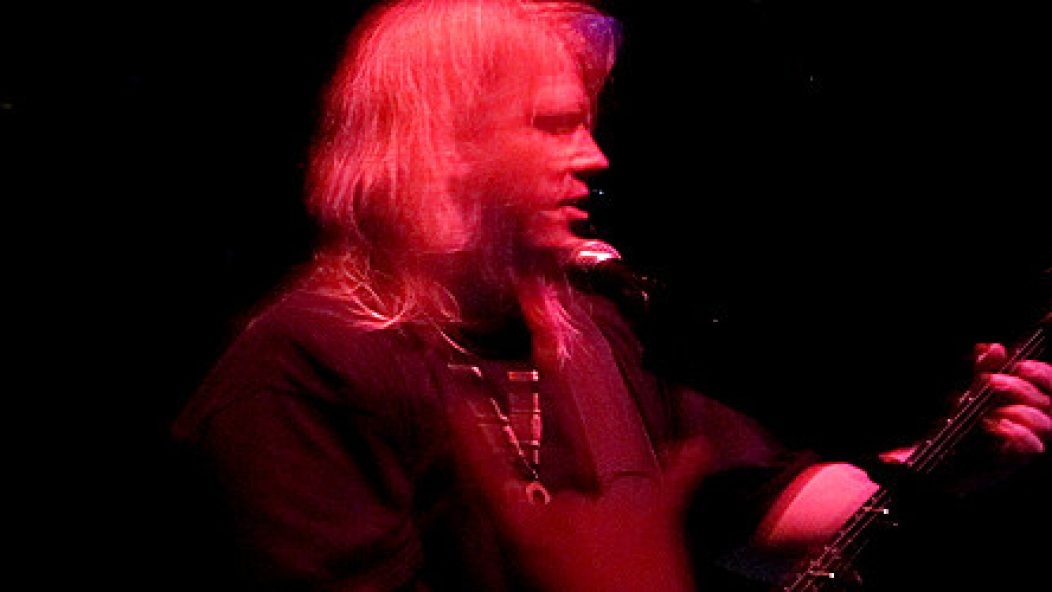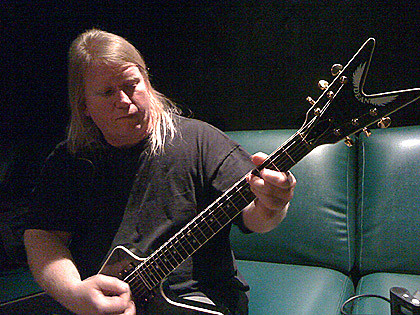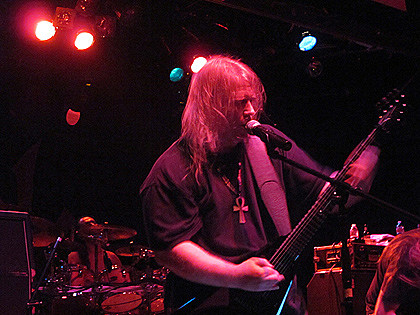
Interview: Karl Sanders (Nile)
The two times I’ve seen Nile this year were both lessons in power. (See live review from February here.) They’ve shed their reputation for live inconsistency; now they kill, and they know it. Last month at Los Angeles’ Key Club, they flaunted a three-vocalist attack and amazing precision and power. It’s easy to sound gigantic in the studio, but harder to do so live. Nile have got “gigantic” down cold. Before the show, I caught mastermind Karl Sanders in a pensive mood. While we talked, he shredded quietly on his guitar while drummer George Kollias napped nearby.
. . .
Wikipedia says that you’re 46 years old.
I’m 47.
OK, 47. You’ve been doing Nile for about 17 years. What’s the secret to playing high-speed death metal this long?
Practice.
Really?
Practice, yeah.
A lot of people practice and shred, but they give it up because the lifestyle is hard. What’s kept you going through all this time?
I was asked a similar question the other day. The question was, “How do you keep going and not fall by the wayside?” And it’s like running a mile. The first time you run a mile, you’re very tempted to just stop running. It’s easy to stop running. It’s very easy. But if you want to run a mile, the secret is don’t stop. And I think that’s a metaphor for a lot of things in life. Playing metal and having longevity – if you stop, you’re not going to keep going. So if you want to keep going, you have to just not stop.
Were you ever tempted to stop with Nile?
Sure. When we lost our original drummer Pete Hammoura, he and I had been making music together since the early ’80s in various bands. We were like brothers. We built Nile into what it was. So it was heartbreaking to lose Pete. [Hammoura left Nile due to injuries sustained from playing.] There were a lot of temptations to give it up right then. The [Amongst the Catacombs of] Nephren-Ka touring had left us all declaring bankruptcy. (Sighs)
But this is what I wanted to do with my life. I wanted to play metal. And I’m not a quitter. I took up taekwondo at age 43, and everyone in my class is half my age and twice as fast. But I didn’t give up. And now I have a black belt to show for it. So that’s really it in a nutshell. If you want to achieve anything in life, you just have to persevere and keep going until you achieve it. If you stop halfway, well, there you go.
Why taekwondo, and not, say, jiu-jitsu or aikido?
The taekwondo dojang was right across the street from my apartment. So I could be there in less than 30 seconds. That meant that I get could in classes all the time, because it was easy and quick to get there.
I love the disciplines where you use more of your hands in a grappling kind of [manner]. Certainly the Brazilian jiu-jitsu kind of stuff really appeals to me. But taekwondo is a challenge because I’m a short guy. I’ve got short legs. To jump up and spin around and kick people in the head, for me, is a physical challenge. I surprise a lot of people when I go to spar. They’re not prepared for me to do that kind of stuff.
Do you find any intersection of taekwondo with metal?
All the time. There’s many times when my teacher will be teaching something, and I’ll understand it because of music and playing metal, the disciplines involved. I think there’s a lot of martial arts discipline [in metal]. If you want to do metal right, there’s a lot of parallels.
So you believe there is a right way to do metal?
(Exhales contemplatively) Yes and no. Certainly, if one wanted to dress up in a ballet outfit and copy Duran Duran, that would be the way not to do metal. But having said that, I think there’s a lot of room for individual styles and finding your own path within the metal genre. But absolute right and absolute wrong – I don’t believe in it.
. . .
. . .
You put out the call for students to teach during this tour. How is that going?
Pretty well. It’s really more than just making some extra dollars to help pay the rent. It’s really refreshing to meet new players and see the way that they approach things. You can learn something from everybody. Even if I’m teaching, I’m still learning and gaining from the experience. It’s a definite yin-yang thing going on when I teach.
You taught students on a previous tour in 2008. Have you noticed differences in players in those two years?
I’d say I’ve noticed over a period of five years – because I teach in my hometown, too – that players are becoming waaay more technically proficient because of the Internet.
What’s a typical lesson with you like?
In the past, I did group lessons, which would be anywhere up to four students. And when you’re doing a group, it’s a lot different than when you do it one-on-one. On this tour, I’m going one-on-one, because it allows for a little more personal customization. You can really personalize and try to help that person’s specific needs. When I’m addressing a group, I’m more or less presenting ideas that I’d like to share.
What is your practice regimen like?
I practice every second that I don’t have to be doing something else.
What do you need to work on in your playing?
Wow! Um. I’ve been focusing the last three months on improving my pick clarity and the dynamic evenness of all the notes. I have noticed while watching myself on YouTube videos, that you can’t always hear everything that I’m doing. And why is that? I’m playing every note, and I’m playing every note pretty clean. But it was an area that I felt could use improvement. I’m tired of not hearing everything, even though I’m fucking playing it.
When I saw you at the House of Blues earlier this year, what struck me was how heavy Nile sounded. I wasn’t expecting that, given Nile’s reputation for speed. Was heaviness a concern when picking the setlist?
I think a lot of times to convey that powerful [feeling], you have to slow it up once in a while. If you play super-fast all the time, people will stop perceiving it as even being fast because there’s no contrast, there’s no meaning.
. . .
. . .
Do you ever feel limited by Nile?
Well, yes and no. Nile is a death metal band with a lot of exotic influences. And that gives us kind of a wide area we can play with. But certainly there’s a lot it doesn’t include. I can’t bust out any jazz fusion licks or bluesy kinds of things. Even heavy rock kind of stuff – it’s inappropriate. It’s not going to work with Nile. Does that bother me? For the most part, no. But it would be nice to find an outlet to express some of the other aspects of my playing.
I suppose that would be your solo albums.
To some extent, yeah.
From listening to them, I’m wondering if you’re a fan of Dead Can Dance.
You know it! Fuck yes, I am. Yeah! It should be apparent, [while] listening to [the solo albums], there’s a lot of Brendan [Perry] and Lisa [Gerrard] that went into the early conceptualization.
If you could travel back in time and offer advice to yourself when you started Nile in 1993, what would it be?
There’s probably some warnings about some of the people we hired. And I would admonish my younger self to be a little more self-confident and not to let the things people say and write hurt you. I’d tell the younger Karl not to let that fuck you up as much because it’s really meaningless bullshit often times that you read about yourself. It puts you in a weird place, and a lot of it is harmful in the end. It doesn’t help you musically. I’d always wanted to think, if you listen to what people say, and you try to hear what they say – everyone has a valid opinion, you know, right? So if you listen, pay attention, you might learn something. I live by that.
But after a dozen years or so of Nile, I realize that only a small percentage of what people actually say has worth. That’s kind of sad, and I don’t want to sound elitist or anything. Sometimes people might have that opinion, but does it actually help you? Does it actually help you quest for self-improvement when you hear ridiculous opinions that have nothing to do with reality? I don’t think so. I’d say to younger Karl, “Do what you’re going to do. Don’t fucking sweat it”.
When you were starting it, did you imagine that Nile would sound the way it does today?
I had kind of hoped it would, but I never thought we would achieve the kind of precision and control that we have now. Back then when we started in ’93, it was a much more monolithic, caveman kind of violence. It wasn’t as refined as it is now.
In the past few years, there’s been a backlash against technical death metal. There’s this return of old-school death metal. How do you feel about that?
It’s music. And music can be whatever. If people want to hear older kinds of metal, that’s their prerogative. And I’m happy that there are bands like that for those people who want that.
I have no intention of going backwards. I’m trying to improve. I’m trying to get better. So for me time-travelling back into the past is counterproductive. Let someone else do that. [But] I’ve heard some really young thrash bands like Warhammer that were really amazing. Exodus – holy shit! Exodus! Those guys are doing that same thing, but now they just do it so much even better.
. . .
Nile – “Kafir!”
http://www.youtube.com/watch?v=gG13hWknobU
. . .
The song “Kafir!” is interesting because the lyrics [about Islam, see here] step out of Nile’s typical mythological emphasis and into the real world. Is reality a concern with Nile?
Generally not. Generally Nile is escapist. We’re escaping back into the ancient history. So to be that openly dealing with current events was out of character for us. But I believe in trying new things and opening new doors and seeing what the fuck is in there, exploring new possibilities. Who knows what else there is that this band could do, could touch upon? I think that song turned out really well for what it is. So I’m glad we took that chance.
Why is Nile escapist?
Well, I lived in Greenville, South Carolina (laughs). A lot of it was, “I’d like to get the heck out of this awful, dreary place where I live”. Playing metal was part of that [desire to] get out in the world and do something – something away from here.
Now you’ve seen a lot of the world because you’ve toured with Nile. Yet you still live in Greenville. Why haven’t you moved elsewhere?
That’s a fabulous question. My wife asked me that: “Why are we still living here?” But I have a son, and I travel a lot. If I were to move somewhere without a grandmother in the near vicinity, then it would be very hurtful to him. He still has to have someone there to care for him when I’m off traipsing around the world. So until he’s grown up, I’m where I’m at. And once he’s grown and can take care of himself, then we’ll see what happens.
How do you remain married while touring so much?
Yeah, this is my third marriage. I’ve kind of seen the pitfalls already. And it’s very difficult on relationships when you’re gone, when you’re off on tours supposedly having fun – although it’s kind of, for the most part, a myth. We do have fun – there is some rock ‘n’ roll living – but for the most part, it’s a lot of hard work to tour. And while your girlfriend or wife is sitting at home, taking care of business, and you’re off [touring], it’s just a recipe for friction. So now what I do, when I can, is I bring my wife with me. She’s selling merch tonight. I put her to work.
I heard that your bassist is now handling lead vocals.
Well, this is more of a return to form. Classic Nile was always a triple vocal attack. When we lost Jon Vesano around Annihilation of the Wicked, it was left to Dallas [Toler-Wade, guitarist] and I to handle [vocals]. It started falling into a lead vocalist with some background vocals kind of thing, and it’s not what we wanted. So it’s a return to original form here, back to what a lot of people consider one of our strengths. We do have three vocalists. Now that we have Chris Lollis [bassist], who’s a strong contributor, we can do that again. And I’m really excited. The next album – there’s a lot of possibilities for some three-vocals stuff again.
You scallop your frets. Why do you do that?
For me, it’s about control. Some people say, “Does it make you play faster?” No, it doesn’t. It actually slows you down quite a bit. But the tradeoff is, you can get more control over it. If you look at the shape of the scallop, it’s curved. If you look at the shape of your finger, it’s not flat. A normal fretboard is flat. If you stick that in there, see how it fits? (His finger fits perfectly in the scallop.) The flesh goes kind of around the string [as opposed to just resting on it]. So you’re getting a little bit under it, even as you’re touching it. So you’ve got a really good grip on it. You’ve got more control. (He peels off some sweet blues bends.)
. . .
Karl Sanders – “Rapture of the Empty Spaces”
http://www.youtube.com/watch?v=LpKFaN1wXFA
. . .
Have any Middle Eastern musicians told you that you were doing their music right or wrong?
Ashmedi [from Melechesh] tells me that all the time. He says, (imitates accent) “Karl, your stuff sounds unbelievably authentic”. There’s a Turkish guy, Yener Ozturk, who moderates our forum – he’s a guitarist who lives in Turkey, and he says the same kind of thing. About my baglama saz playing, he’s quite funny. The baglama saz is the folk instrument of Turkey, and everybody can shred like crazy on it. But when I play the baglama, I don’t shred. I play like [how] I play, nice and slow, very expressive, not too much fast stuff. And he says because I play it completely different than everyone else, it’s interesting to listen to.
What does death metal mean to you?
It is my life. I spend a lot of my time doing death metal, participating in death metal, being involved in death metal activities. So it’s my life. I live it, I eat it, I breathe it, I sleep it.
But what does it mean? I wondered that myself for a long time until the Gorefest album called False, a very classic album in the early ’90s. It kind of became clear through what their lyrics were talking about. What is death metal, and what does it mean to me? What is its place in this world? What’s its purpose?
The profound thing about death metal, and what it actually means, is that we’re singing about all these gruesome things and horrible ways to die and zombies taking over the world and Satan spewing his wrath, [and the lesson is] life is short, and it can end in really nasty ways, but either way, it does end. We all will die. You can look at that and be morbid about it. A lot of people get trapped in that. They can’t get past that. Or you can say, “OK, I am going to die in one of a thousand ways to die”. There’s a great TV program called 1000 Ways to Die. Have you ever seen it?
No.
Oh, it’s hilarious. It’s a lot of stupid people doing a lot of stupid shit, and they end up killing themselves, and they were foolish with their lives.
Right.
There’s a million ways to die. Million, thousand, whatever. But you will die. So whatever little period of time you have on this planet is all you got. You can either do something with it, or not do something with it. I personally would rather do something with what time I have than the alternative. There are so many people who are already dead, who are not doing anything with their lives. It almost takes a philosophy, a music as brutal as death metal, to wake people up and go, “Hey! You’re going to die! Wake the fuck up!”
I asked that question recently to Ross and Bob of Immolation. (See interview here.)
I love those guys.
The way they answered it was purely in terms of a lifestyle. They didn’t get into it philosophically at all. They just looked at it like, “This is what we do”.
They don’t even think about it. Nope. That’s fine, because they are doing something. When I look at it, those guys have fucking worked hard to be what they are. And, dude, there’s no better way to be alive.
. . .












